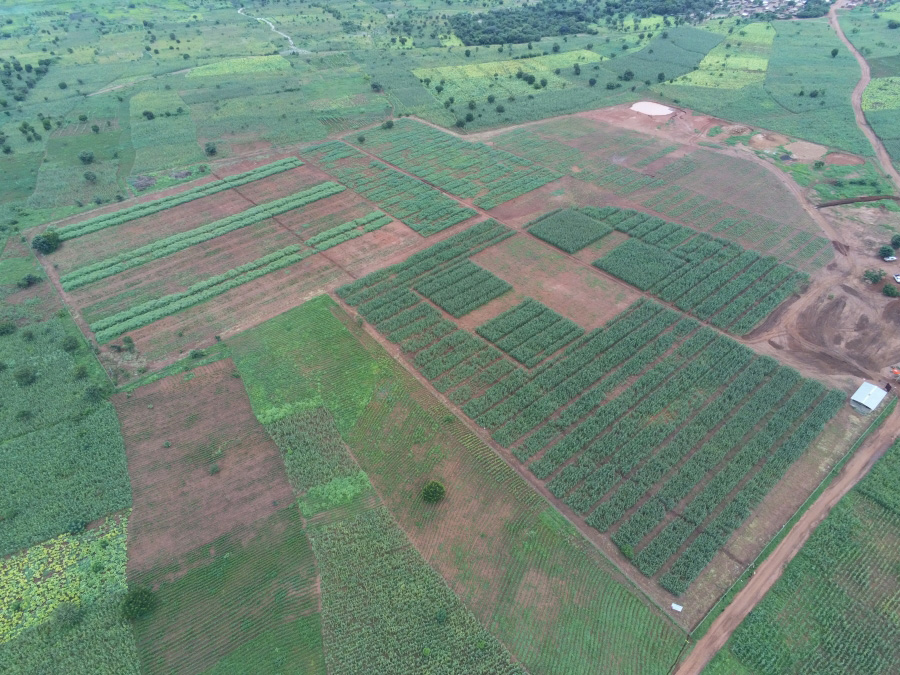
Mining
Sovereign conducts successful rehabilitation of mining test pit
April 03, 2025 / Marcel Chimwala

Rehabilitation site (February 2025)
ASX-listed Sovereign Metals has announced that rehabilitation of land at the test pit site mined during the pilot phase of its Kasiya rutile-graphite project in Lilongwe has made substantial progress.
Sovereign Metals MD and CEO Frank Eagar explained that soil remediation work under its pilot mining and land rehabilitation programme was concluded in December 2024 with landowners accessing the site between December 2024 and January 2025 to plant and cultivate crops without missing a planting season.
Sovereign continues to provide support and training to landowners to improve crop yields, including introducing conservation farming techniques, which have already resulted in a tripling of crop yields.
“The successful return of farmers to their land within such a short time and without missing a single planting season after mining and backfilling 170,000m3 is an excellent outcome. This demonstration of responsible mining and land rehabilitation will build on our positive community relationships,” said Eagar
“The pilot phase of 90 farmers selected for our Conservation Farming programme has been increased to 350 for this season. Early indications are that the second season of this programme will exceed the 300% yield increases achieved in the pilot phase. The empirical data collected from these trials will feed directly into our Definitive Feasibility Study designs for mine closure and land rehabilitation.”
Rehabilitation crops, including giant bamboo, sun hemp, groundnuts and mung beans, are being tested alongside staple maize crops.
He said: “The rehabilitation programme successfully demonstrates how mined land can be quickly and efficiently returned to productive agriculture during future full-scale operations.”
“All soil remediation works as well as planting was done by hand with the use of a grader and tractor to prepare the soils. Sovereign appointed the local landowners to work with us in both the soil remediation and planting work, so that they were able to directly experience and learn about our rehabilitation work on their land.”
Sovereign is working closely with the landowners to ensure that the crops provide a good yield in 2025, while simultaneously testing a variety of rehabilitation crops. This includes the intercropping of giant bamboo with maize, which will be retained by the landowners.
“Sovereign is committed to ensuring that all mined-out land is appropriately rehabilitated to support sustainable farming practices after closure.”
Eagar explained that the soil remediation methods aim to revitalise the soils within two-to-three-years to ensure that land can be sustainably farmed in the long term. The remediation of soil to a depth of one metre from the surface will ensure the land can support future commercial farming practices.
As part of the pilot phase, the company has constructed small rehabilitation demonstration pits that will be used to illustrate multiple and ongoing rehabilitation processes.
REHABILITATION APPROACH
The rehabilitation approach is based on agronomic principles, including promotion of sustainable farming practices and provision of various land uses after mining is finished. Rehabilitation is underway through a five-step process:
Step 1: Introduce Lime (Complete)
The soil remediation commenced with the application and incorporation of locally sourced dolomitic lime (calcium and calcium-magnesium-carbonate) to improve naturally low pH levels
. Step 2: Introduce Carbon and Basic Nutrients (Complete)
Sovereign augmented the mined area with organic carbon and basic nutrients. Tests included the application of biochar to provide carbon and fertiliser in the form of potash (MOP), phosphate (MAP) and a blend of nitrogen, potash and sulphur (NPK) 15:23:16).
Step 3: Grading, Ripping and Discing (Complete)
Lime, biochar, and fertiliser were incorporated into the soil through grading, ripping, and discing using graders and locally sourced farming equipment. This ensured that the land was level along with safe working conditions.
Step 4: Planting of Rehabilitation Crops (In Progress)
Since December 2024, Sovereign has been planting rehabilitation crops to maximise the benefit of the coming summer rainfall. Giant bamboo has been introduced in 4 by 8 metre blocks, which will act as the primary crop to enhance carbon and bio-activity in the remediated soils. Maize and other cover crops have been intercropped between the giant bamboo within re-organised farm blocks.
Step 5: Monitoring and Evaluation (In Progress)
Sovereign continues to monitor soil remediation, plant growth and crop yields. As part of stakeholder engagement, the company is working with local farmers to improve results through conservation farming, composting operations, testing new seed varieties and establishing an indigenous fruit and farming nursery. This is serving as a live demonstration of rehabilitation and timely return of land to a pre-mining state. Results of an optimised pre-feasibility study that Sovereign completed in 2025 in conjunction with its strategic partner global mining giant Rio Tinto have shown that Kasiya is well positioned to become the lowest cost producer of both rutile and graphite, reconfirming Kasiya’s potential as leading global future supplier of strategic critical minerals outside of China. Kasiya hosts the world’s largest natural rutile deposit and second largest natural flake graphite deposit globally.































